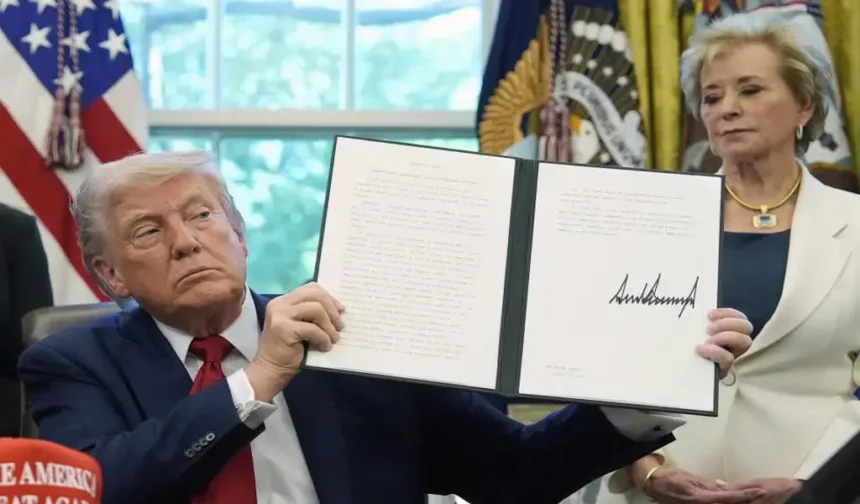(CTN News) – A federal judge stopped Trump administration guidelines on Thursday that threatened to reduce federal funding for diversity, fairness, and inclusion efforts in public schools.
The decision was made in reaction to a lawsuit filed by the American Civil Liberties Union and the National Education Association. The Republican government was accused in the case of violating the First Amendment and due process rights of teachers.
In February, the U.S. Department of Education issued an order requiring educational institutions to forbid any practice that separates people on the basis of race.
Earlier this month, the government issued a directive to the states, requesting that they gather signatures from local school systems to demonstrate adherence to civil rights laws. The federal government requires signatories to denounce.
“Federal education practices that are illegally discriminatory.
Despite the guidelines’ lack of legal authority, they threaten to utilize civil rights enforcement to purge schools of DEI activity.
Schools that used such practices, which are considered to be “in violation of federal law,” could risk losing government contracts and funding as well as facing legal action from the US Department of Justice. Judge Landya McCafferty of the US District Court emphasized in her decision that the directives were “unconstitutionally vague,” as the case contended.
She claims that the April letter is vague about what the department considers to be a diversity, equity, and inclusion (DEI) program and when it goes too far and violates civil rights law. The letter doesn’t try to define what a “DEI program” is, McCafferty said.
“There is reason to believe that the department’s actions violate teachers’ right to free expression,” the court continued.
A lecturer violates the 2025 Letter when she discloses in her instruction that systemic racism occurs in the US. She is not breaking the 2025 Letter, though, if she denies the reality of systemic racism. According to McCafferty, “That is pure textbook viewpoint discrimination.”
Despite having until Thursday to provide evidence that their institutions are in accordance with the new standards, some states have stated that they will not follow the rule. Diversity, equality, and inclusion (DEI) is not a crime, according to school officials in a number of Democratic-led jurisdictions. They have claimed that the government has overreached itself.
According to the March complaint, the February 14 memo—officially referred to as a “Dear Colleague” letter—will restrict academic freedom by prescribing what students can learn.
The email claims that schools have given diversity, equity, and inclusion (DEI) activities more importance than those for Asian American or white kids.
The Supreme Court’s 2023 ruling banning the use of race in college admissions has been significantly expanded to cover all facets of education, including employment, promotions, housing, scholarships, commencement exercises, and campus life.
An additional challenge to the memo has been filed by the American Sociological Association and the American Federation of Teachers.
These groups have petitioned a Maryland federal court to stop the EPA from implementing the document.
According to both Federal lawsuits, the rule is so ambiguous that it leaves educators and schools unsure of their rights The lawsuits, for instance, call into question the legality of voluntary student organizations for children from minority groups.
President Donald Trump’s secretary of education, Linda McMahon, has warned of financial cuts if states do not return the documents by Friday.
McMahon said states that don’t agree “risk some defunding in their districts.” During a Tuesday interview on Fox Business Network, this assertion was made. Her statement states that the purpose of the form is “to ensure that there is no discrimination taking place in any of the schools.”
The April mandate required Federal states to get the certification form from their local school systems and sign it on the state’s behalf. By doing this, schools would be guaranteed to adhere to Title VI of the Civil Rights Act of 1964.
The new form does, however, contain wording regarding diversity and inclusion that cautions against discriminatory use of diversity initiatives, which may lead to penalties, funding cuts, and other repercussions.
This is on top of the fact that states and schools are already obligated to provide these guarantees in their own ways.
Title I, the biggest source of federal funding for K–12 education and a vital tool for schools serving low-income communities, is at risk due to this form. ___-
SOURCE: AP
SEE ALSO:
Workers Leave the IRS, Leadership Changes, and Threats to Tax-Exempt Status.
The US Supreme Court Temporarily Halts Venezuelan Deportations During Wartime.
Chiang Rai Cracks Down on Entertainment Venues After Minors Employed as Hostesses

Salman Ahmad is known for his significant contributions to esteemed publications like the Times of India and the Express Tribune. Salman has carved a niche as a freelance journalist, combining thorough research with engaging reporting.













